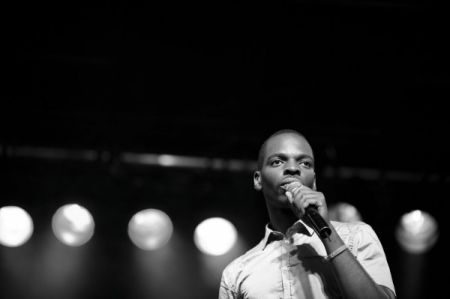While Chuck D’s famous phrase “Rap is CNN for black people,” has been quoted by countless ‘reality’ rappers, there are few artists who have embraced the concept as throughly as Emrical. The only difference is that in this case the Montreal-based emcee reports from the racially diverse low-income community of Montréal-Nord.
Emrical’s latest video Combien de Morts focuses on the tragic death of Fredy Villanueva, a teen who was shot by police in Henri-Bourassa Park on August 9, 2008. It is an incident that spawned a riot and was followed by a flood of newspaper headlines, local TV and radio coverage and anonymous online vitriol.
Villanueva’s death has also prompted heated debates on the topics of racial profiling and the deportation of non-citizens with criminal records to their country of origin. (Fredy Villanueva’s brother Dany, one of the main witnesses in the police shooting, may be deported to Honduras based on charges he received in the Spring of 2006.) This Thursday Montrealers will gather for a vigil in Henri-Bourassa Park to commemorate Fredy Villanueva’s death.
Recently, I interviewed Emrical, also known as Ricardo Lamour-Blaise, about the making of the Combien de Morts video, the issues that continue to plague the Montréal-Nord community and the Villanueva family.
Art Threat: The opening scenes from the video show a crowd of people gathered at Henri-Bourassa Park to commemorate Fredy Villanueva’s birthday. Can you describe what it was like to be part of that crowd?
Ricardo: Well, it’s been a while since I’ve tried to go to the gatherings organized by Fredy’s family. It’s not fun. It’s a time to reflect and to also be confronted by the harsh reality that Montréal-Nord will do everything to forget Fredy Villanueva instead of paying tribute to him and kids that look like him. The Montréal-Nord mayor is not trying to develop a new culture of collaboration to get rid of systemic violence. His leadership is marked by denial of the obvious.
What goal did you have in mind when you set out to make the video?
My goal was to do a video that would confront people with their unwillingness to face their taboos about victims of the system. My message is: If you think the victims of police brutality are mostly bad, immoral, punks, uneducated and foreigners why don’t you get off of facebook and come see if your perception matches reality. You might be surprised to realize how alike we all are in our humanity.
Can you break down your approach for me?
At first, I brainstormed with friends that do movies. We decided to just go with reality since I was asked to emcee a march with the families of the victims of police brutality. I decided to have this march filmed and then add different layers to it: one, the guy who is trapped and wants to escape; two, living-room racism, a term used by Quebecois-writer Nelly Arcan in one of her great opinion pieces about Dany Villanueva and the folks that hide behind their computers to spit on him; three, victimization of the culprit (the police); four, the symbolism of the Villanueva affair; five, the link with the other victims of police brutality. Finally, I wanted to connect the dots with other local and international struggles.
What kinds of challenges did you run up against?
Editing, time, partners, funds, doubters, organizational skills. I wish I was connected to a network that funds such endeavours. Sometimes you have ideas and you face a wall ‘cause of your technical limitations. Also, people are addicted to money like lungs need oxygen. If I had the money the clip would have gone from cool to “Houston, we have a problem!” Now, to me, the clip is cool.
Kyvy Leduc, Yanick Létourneau and Boite Rouge [a media outlet for the Québec student movement] were really helpful as they saw this project as a collaborative effort. The other folks that I approached kept delaying their involvement in the project or wanted to get paid and I could not pay them enough. Also, there were doubters. In the end, these people (doubters) need to know that we are legions and we are united in memory of the victims of the system.
You open with a number of radio clips from a Québecois call-in-show with callers giving their take on Fredy and Dany. What role has the media played in shaping public opinion of the Villanueva affair and Montréal-Nord in general?
The corporate media is the puppet of those in power. They will tickle the system but they won’t expose it … I think the media had helped generate sympathy for the Villanueva family for the loss of Fredy Villanueva but with the dragging on of this affair, the discrediting tactics of the Montreal city lawyer and police lawyers of Dany Villanueva, his friends and key witnesses caused a change of public opinion. The media failed to systematically question the privileges bestowed on Jean-Loup Lapointe and Stephanie Pilote [the police involved in the incident]. It was safer to antagonize Dany Villanueva for his resistance strategies.
If people knew how a past lawyer had suggested to Dany to plead guilty at what is now considered one of his first infractions due solely to the fact that his friends were responsible but all had cases and how this lawyer failed to inform Dany that if he pled guilty, he could later be deported, and how this bad counceling still has consequences to this day, people would maybe be more disgusted with the violence of the system and not with the perceptions of violence coming from Dany Villanueva. This guy was not arrested for killing, raping and molesting. Yet, you hear more about him than about Jean-Loup Lapointe, the guy that shot his brother and two other friends, never expressed any remorse, has a bad reputation in Montréal-Nord and still patrols to this day.
I was a little surprised to see nothing but positive feedback for the Combien de Morts video on YouTube. Have you received any backlash?
Some people have told me that their problem is with Dany and the reasons for his arrests after the death of his brother. The video sparks a dialogue and is an opportunity for me to inform (people and show another) angle of this tragedy. As far as the positive feedback for the video, I think I will take it more seriously when more folks see it. I wanted this video to be a reflection of how people think mixed with exposing the people supporting the families of the victims. It’s not perfect but we tried to do like Hamlet says: “hold, as ’twere, the mirror up to Nature” Some hate Dany, some support the cause. Personnally, I’m just fed up with living room racism and I refer haters to Nelly Arcan’s article.
Have you remained in contact with the Villanueva family? What do you think the future holds for them?
Yes. I could give you a microwave answer but we have a complex situation. To answer this question, I felt like I needed to talk with Lilian [Fredy and Dany Villanueva’s mother]. Here is what she told me: “I want my son to stay here [in Canada]. It would be the best scenario to start a new life. The life we had has been destroyed since Fredy is absent. We won’t forget him. Dany is still alive. We will start a new life.”
Lilian’s family members who still live in Honduras go through enormous stress and persecutions due to the media’s portrayal of Dany Villanueva as something he is not. Add to that the possibility of him being sent back to Honduras after spending way more than half of his life in Canada. Honduras is a country known for its serious violations of human rights as presented by Human Rights Watch reports, Amnesty International, and Refworld [UNHRC].
However, this does not stop Canada from being timid (in their response to) the 2009 coup and doing big business with the Hondurian government. Direct Canadian investment is prominent in Honduras in garment manufacturing and mining. According to Natural Resources Canada statistics, total assets employed by Canadian firms in mining amounted to $146 million by 2009.
With all this, why care about social responsibility from Canadian corporations and human rights violations in Honduras? This is the type of dot connecting we need to do as priviledged Canadian citizens. We need to think about what the conditions will be like for the people we send back to their country of origin. The Villanuevas still struggle with the loss of Fredy, the consequences of his death and not knowing what will happen with Dany.
The pain is unbearable and increases when the (anniversary) date of the assassination of Fredy approaches. Fredy’s mother cannot stop the outburst of tears. She says, “time passes but pain remains. Life goes on, but the family is always wondering what will happen of Dany. It’s not a beautiful life. It all causes me enormous pain.”
This piece was originally published on Art Threat. Part one of this interview was conducted and published last year. For more information visit this Facebook page.




